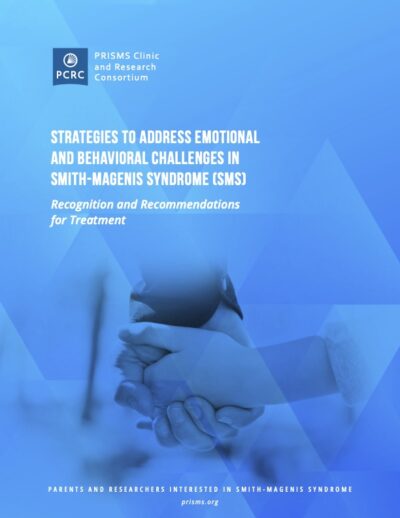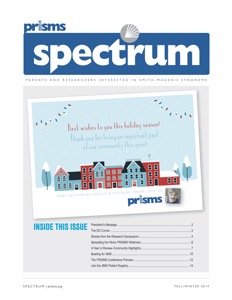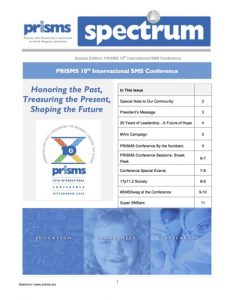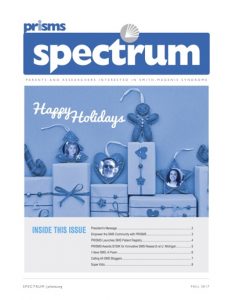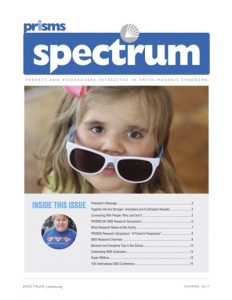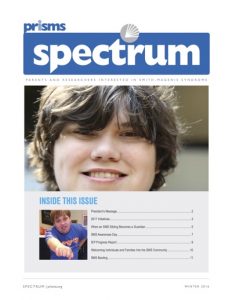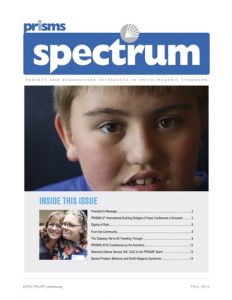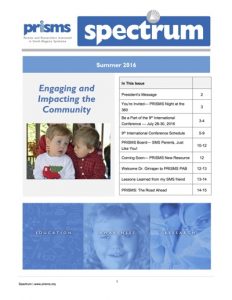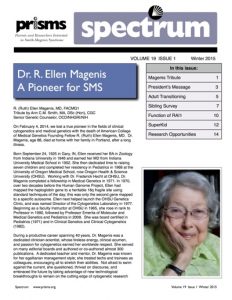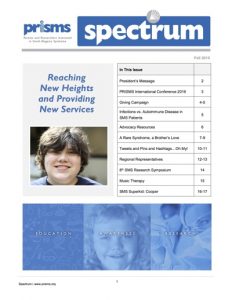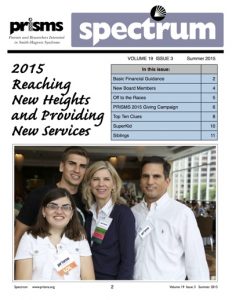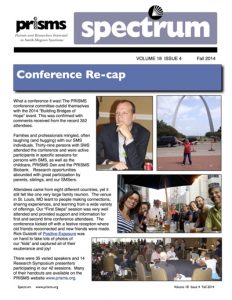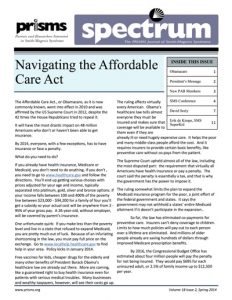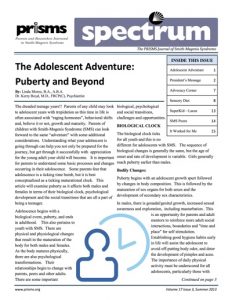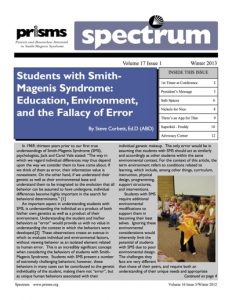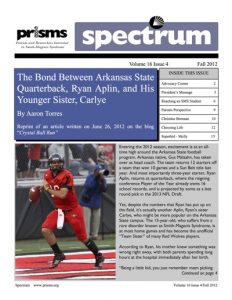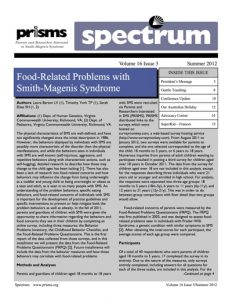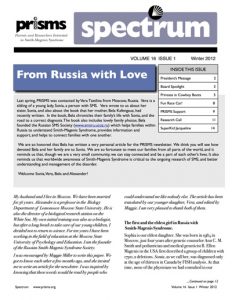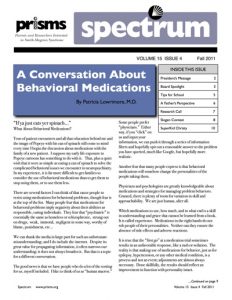A Guidebook on Emotional and Behavioral Challenges in Smith-Magenis Syndrome
PRISMS Publication by: Barbara Haas-Givler, Rebecca Foster, Christine Brennan, Kerry Boyd, Hanna Hildenbrand, Mary Beall, and Cora Taylor
Approaches to understanding emotional and behavioral challenges in Smith-Magenis Syndrome (SMS) vary but should begin with an awareness of traits commonly observed among individuals with SMS. Educators, clinicians, and others who work with children and adults with SMS often find them to be energetic, enthusiastic, and endearing. Although strengths exist, individuals with SMS also commonly demonstrate significant challenges with emotional and behavioral dysregulation across the lifespan, which can often pose difficulties for individuals with SMS, their families, professionals, and community members who interact with them.
PRISMS is pleased to provide guidelines called “Strategies to Address Emotional and Behavioral Challenges in Smith-Magenis Syndrome (SMS)” that offer recommendations for parents and those caring for individuals with SMS to approach emotional and behavioral challenges by understanding the person, the syndrome, and effective practices.
A Guidebook for Families Newly Diagnosed with Smith-Magenis Syndrome
PRISMS Publication by: Leah Baigell, Barclay Daranyi, Melissa Haley and John Mayer
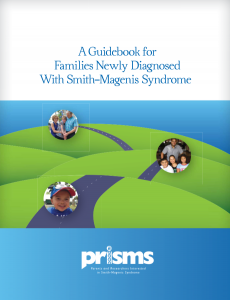
On the Road to Success with SMS: A Smith-Magenis Guidebook for Schools
PRISMS Publication by: Barbara Haas-Givler & Brenda Finucane
In this PRISMS resource, Barbara Haas-Givler and Brenda Finucane share practical tips, strategies and accumulated wisdom from their many years “on the road with SMS”.
The “On the Road to Success with SMS: A Smith-Magenis Guidebook for Schools” is available in digital form via Kindle. If you do not own a Kindle, there is a free Kindle Reading app that will allow you to purchase and download the resource for other mobile devices and computers.
| English Version | Danish Version | |
| French Version | Spanish Version | |
| German Version | Russian Version |
If you are interested in working with PRISMS to translate the publication into additional languages, please contact us at info@prisms.org.
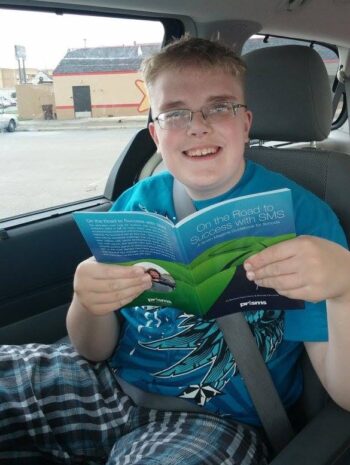
You can also purchase a paperback version of the “On the Road to Success with SMS: A Smith-Magenis Guidebook for Schools” book. Books are $25 plus shipping. To order copies of the book, go to https://www.prismsstore.org/Products/ProductGrid/Resources?r=1
If you have any questions or issues with your online order, please contact us at info@prisms.org.
A Smith-Magenis Guidebook: Exploring Adult Residential Living
PRISMS Publication by: Deborah Wehrlen, John Mayer, Leah Baigell, Barclay Daranyi, Mary Beall, Brandon Daniel, Emily Fields

Recognizing the need to support those with Smith-Magenis syndrome beyond school-age years, PRISMS formed a workgroup chartered to explore residential life post “high school” and to create a publication for the SMS community. This group included parents of adults with SMS and professionals skilled in developing residential services.
The guidebook includes information about a variety of residential programs, both in the home and in the community, helpful ‘how to’ suggestions for finding support and funding, and case studies contributed by families from across the country. These case studies provide personal insights about the benefits and challenges of different living situations. Also touched on are how these young adults spend their days.
This guidebook is available at no charge as a downloadable PDF file.
We rely on generous donations and support from individuals, like you. Please consider a tax-deductible donation to PRISMS today to support the creation of future publications.
You can make a difference too!
Spectrum Journal
The PRISMS Spectrum Journal online library is filled with back issues of the publication that were published throughout each year (up to 2019) and emailed to all PRISMS members. Expand the section below to view the publication archive and specific issue on the Spectrum Journal.
Resources
We offer the following external links as a guide to resources that may help you to gain knowledge and inform you in your efforts to establish supports or a meaningful program for your family.
Please feel free to share your thoughts on these resources or suggest other links that would be useful for our community by emailing us at info@prisms.org.
Technical Literature about SMS
The following are online portals to access medical journals and technical information about various medical or genetic conditions.
OMIM SMS Literature Search – search for all research publications on SMS
PubMed Literature Search – search for research publications by author or journal title
Genetics
The following are online resources related to genetics, genetic conditions, and rare syndromes.
Chromosome Disorder Outreach – Chromosome Disorder Outreach, Inc., is a nonprofit organization providing information and support for families and professionals affected by a wide range of chromosome disorders, including deletions, duplications, trisomies, inversions, translocations, and rings.
Genetic Alliance – the Genetic Alliance is an international coalition of individuals, professionals and genetic support organizations that is working together to enhance the lives of everyone impacted by genetic conditions.
National Society of Genetic Counselors – a database of genetics counseling services, searchable by location, name, institution, type of practice or specialty.
Unique – Unique is a source of information, mutual support and self-help to families of children with any rare chromosome disorders including deletions, trisomy, balanced translocations, unbalanced translocations, rings, inversions, duplications, tetrasomy, monosomy, triploidy, isodicentric, marker, mosaic, and sex chromosome aneuploidy.
International SMS Support Groups
Outside of the United States you can connect with SMS support groups in these countries:
Smith-Magenis Syndrome Foundation (United Kingdom)
Association Smith-Magenis- ASM17 (France)
Sirius e.V. (Germany)
Smith-Magenis Italy (Italy)
Smith-Magenis Syndrome (Denmark)
SMS Australia (Australia)
Russian SMS Society (Russia)
Smith-Magenis Mexico (Mexico)
Association Smith-Magenis (Brazil)
Advocacy
The following national organizations will lead you to agencies in your state – each mandated by the United States Government through the American with Disabilities Act to provide services to families.
The Association of University Centers on Disabilities
The Association of University Centers on Disabilities (AUCD) is a membership organization that supports and promotes a national network of university-based interdisciplinary programs to assist people with disabilities and their families.
National Disability Rights Network
NDRN is the nonprofit membership organization for the federally mandated Protection and Advocacy (P&A) Systems and Client Assistance Programs (CAP). There is a P&A/CAP agency in every state and US territory as well as one serving the Native American population in the four corners region. Collectively, the P&A/CAP network is the largest provider of legally based advocacy services to people with disabilities in the United States.
National Association of Councils on Developmental Disabilities
The National Association of Councils on Developmental Disabilities (NACDD) is the national association for the 56 Councils on Developmental Disabilities (DD Councils) across the United States and its territories. The DD Councils receive federal funding to support programs that promote self-determination, integration, and inclusion for all Americans with developmental disabilities.
Education
The following organizations provide information, programs, and services dedicated to educating and supporting families of persons with disabilities. These organizations focus primarily on the United States.
The ARC – The ARC is a national organization of and for people with intellectual delays and related disabilities and their families. The ARC has local chapters in communities across the United States.
AAIDD – Since 1876, AAIDD has been providing leadership in the field of intellectual delays. AAIDD is the oldest and largest interdisciplinary organization of professionals concerned about intellectual disabilities and related disabilities.
Council for Exceptional Children – The Council for Exceptional Children (CEC) is the largest international professional organization dedicated to improving educational outcomes for individuals with exceptionalities, students with disabilities, and/or the gifted.
National Association for Dually Diagnosed – National Association for Dually Diagnosed (NADD ) is a not-for-profit association designed for professional and family interests on behalf of individuals who have developmental disabilities and mental health needs. NADD has been influential in the developmental of appropriate community based policies, programs and opportunities in addressing the mental health needs of persons with mental retardation.
Wrightslaw – Wrightslaw is for parents, advocates, educators, and attorneys who want accurate, up-to-date information about special education law and advocacy for children with disabilities.



